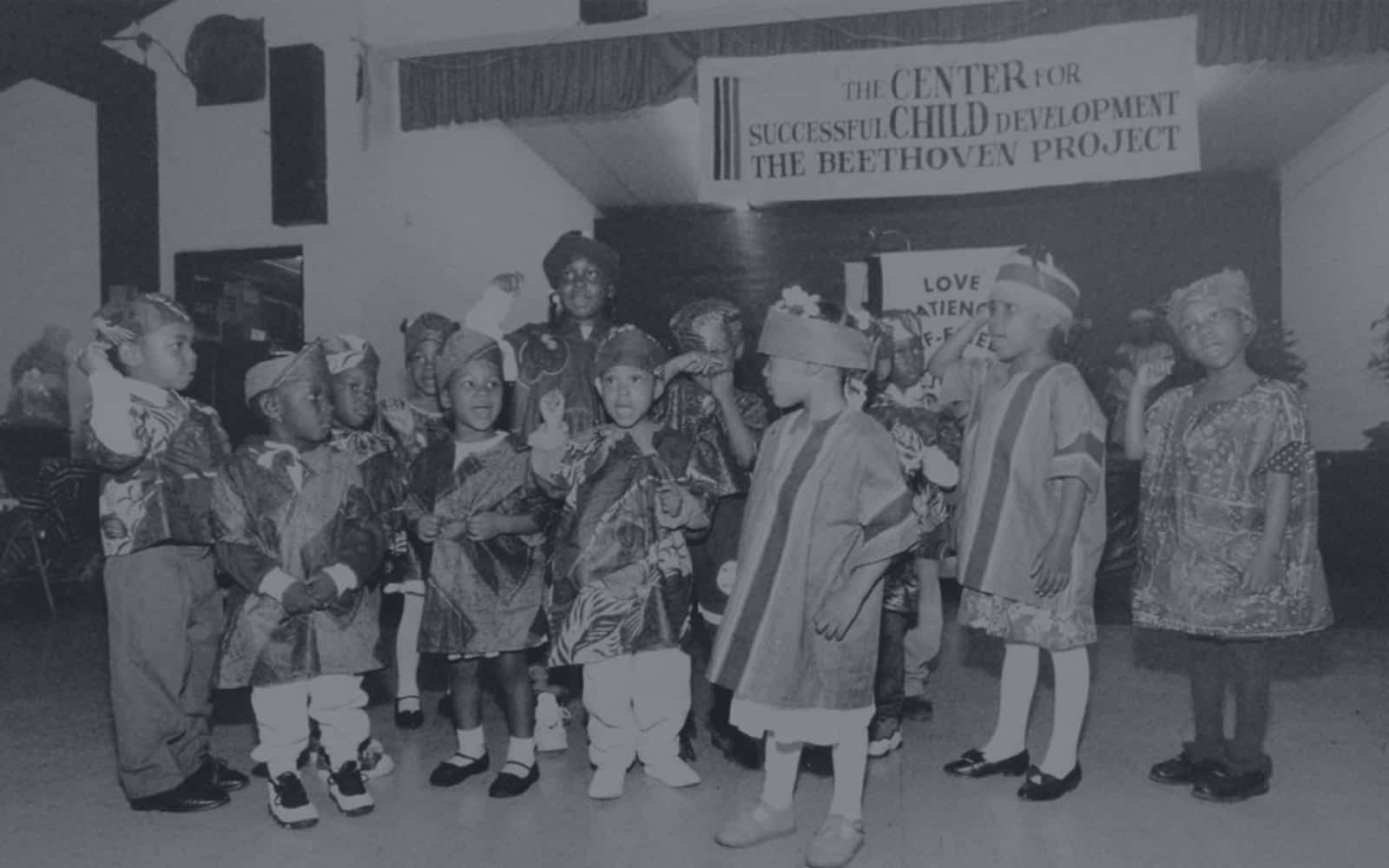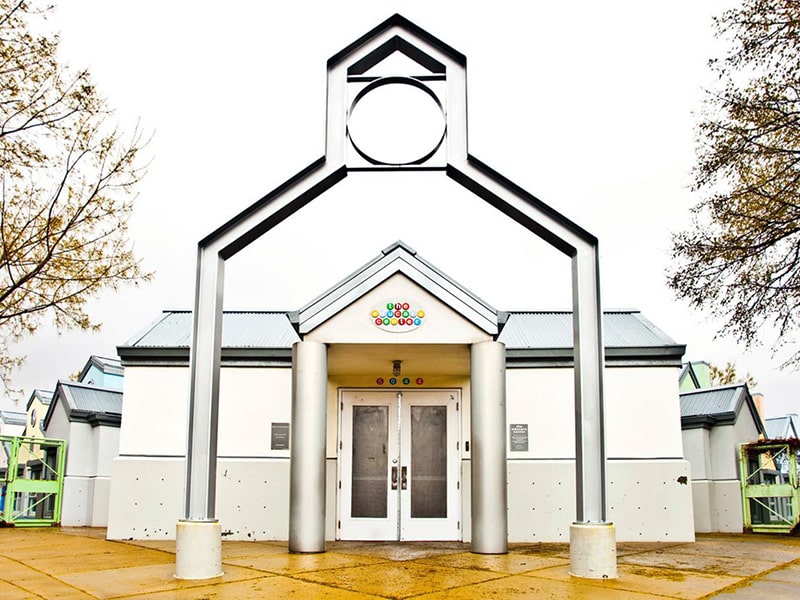Start Early Washington is fortunate to work with committed partners like Perigee Fund who believe in the power of healthy relationships with caregivers to give babies and toddlers the best start in life. Learn more about how Perigee Fund prioritizes investment in infant and maternal mental health in our recent conversation with Perigee team members Becca Graves and Kim Gilsdorf.
Stay Connected
Sign up to receive the latest early learning program and policy news in Washington state.
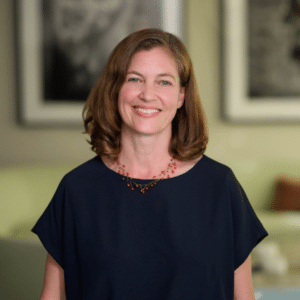
Looking for Bright Spots
What are some of the biggest things you’ve learned in supporting infant and maternal mental health?
Becca: I have been really impressed by the leaders that we have encountered in Washington State and across the United States. We all know there are not enough resources in the ecosystem to support families. We also know there is not enough support for the work that infant and maternal mental health leaders are doing. Yet so many leaders are willing to step forward with partners and make things happen. For example, Perinatal Support Washington and Start Early partnered to provide home visitors with Maternal Mental Health training. That partnership has created new mental health resources for the workforce and for families.
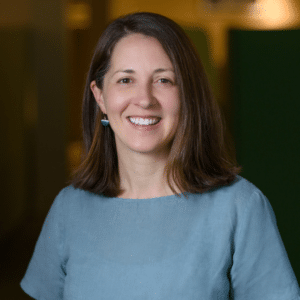
Kim: Because early childhood and parent mental health is so under-resourced, there are opportunities for progress in many kinds of systems. That is helpful because as we seek to fund systems change, we can remember we don’t have the answers. We can’t foresee which groups of stakeholders, in which systems, are going to rise to the occasion because they care deeply about the bond between caregivers and a child, and they see how important that is to their work.
In Tennessee we see leadership from community behavioral health, in California we see innovation led by pediatricians and community health workers, and in New Jersey there are doulas growing access to maternal mental health care. These examples are the tip of the iceberg. The diversity of ways to make progress is both a lesson learned as well as an approach we can continue to support.
Creating a Movement
(Start Early) Are you finding new champions for infant and maternal mental health emerging since Perigee began in 2018?
Becca: We have learned that there are champions everywhere. I think our mission calls us to learn about opportunities to help everyone see the importance of child and family wellbeing and valuing the earliest relationships. Particularly where there are instances of trauma in a family’s experience, either now or intergenerationally.
Whether it’s guaranteed basic income or child welfare, there are people in tune with needs and opportunities, and there are people who are curious and want to learn more. By gathering people together, getting to know one another, and talking about the issues, you can see the places where the family economic security goals and the mental health goals can come together and be in alignment.
When parents experience adversity, such as poverty, trauma and racism, their children can feel lasting effects, even into adulthood. Early support for babies, families, and caregivers can lessen the impact, leading to better long-term health and well-being.
Perigee Fund
Building for the Future
What would the biggest impact or change you would like to see over the next 10-15 years because of Perigee’s intentional investments?
Kim: I’d like to see policy makers have a greater understanding of the fundamental importance of early relationships. That mental model shift is part of creating policies that make mental health support more equitable and more accessible for families with very young children.
Becca: We need to value and embed support for families in the places where they are. Certainly, there are many ways that families support themselves and communities support families that don’t require additional resourcing, but they do require us to respect and value the importance of family relationships and community relationships and not get in the way. And there is a lot that we should be doing differently with our public policy and with the ways that we think about community-based models of care.
Supporting the Field
This is hard work and it’s not as easily measured as “can your child read by third grade.” Perigee has been such a champion in helping to advance our Neuroscience, Epigenetics, Adverse Childhood Experiences, Resilience (NEAR@Home) trauma-informed training to support home visitors in building a hope-focused approach when talking with families about trauma. It is also some of the most promising work we have for infant and maternal mental health. Can you tell us about why you chose to support NEAR?
Kim: NEAR does something with grace that is both important and difficult. It helps families and providers navigate difficult conversations about trauma, slowly and with compassion. Conversations about early childhood trauma can be very challenging for all involved, which is part of why many infant mental health professionals are invested in ongoing learning and reflective supervision. NEAR makes it possible to integrate some of that skill building and support into the job of being a home visitor. Regardless of their degree or education, all home visiting professionals trained in NEAR get the support they need to navigate hard topics with families and to do so with kindness and love. It is incredible!
Learn more about Perigee Fund’s priorities for Infant and Early Childhood Mental Health.
For more than a decade, Lula M. Ford has served on Start Early’s Board of Directors, contributing to the organization’s growth and impact on families with young children across the country. While Ford joined the Start Early leadership team in 2009, her impact on and experience in the field of early education spans decades, particularly playing a monumental role in expanding opportunities for children and families throughout Chicagoland.
Celebrating 40 Years of Changemaking
Start Early is 40! Early childhood education and care has changed dramatically in America over the past four decades, and Start Early has always been at the forefront of that change.
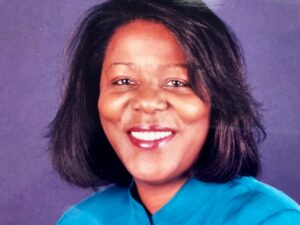 Ford was born in Pine Bluff, Arkansas, before relocating to Chicago in the late 1960s. From there, after completing two master’s degrees from Northeastern University and the University of Illinois, she began her career in education. She started as a teacher at Horner Elementary School, and eventually became the Principal of Beethoven Elementary School in the early 1990s.
Ford was born in Pine Bluff, Arkansas, before relocating to Chicago in the late 1960s. From there, after completing two master’s degrees from Northeastern University and the University of Illinois, she began her career in education. She started as a teacher at Horner Elementary School, and eventually became the Principal of Beethoven Elementary School in the early 1990s.
It was around that time that Ford started to take notice of the work being done in early education by Start Early (known as The Ounce of Prevention Fund at that time).
“I met with [Start Early founder] Irving Harris at that time, so when they decided to start Educare Chicago, I knew I wanted to be a part of it. I’ve really been connected with this organization for over 20 years,” Ford shared.
The Founding of Educare
Ford said that it’s been amazing to be a part of an organization that invests in children and their futures.
“We at Start Early believe in quality services,” Ford said. “That has always been my focus, providing quality services for children and families, and I am so proud of Start Early. It’s been amazing to see how we’ve spread nationally, and that’s been very rewarding for me, to see that we are interested in the education of children who are under-served.”
It’s been amazing to see how we’ve spread nationally, and that’s been very rewarding for me, to see that we are interested in the education of children who are under-served.
Lula M. Ford, Start Early Board Member
As for the next 40 years, Ford knows there’s more work to be done to ensure equitable opportunities for our youngest learners.
“Let’s continue to be a diverse staff, that is so important,” Ford said when asked about her vision for Start Early in the next four decades. “We’re on the right track, and we have an outstanding leader in Diana Rauner, and I can’t wait to see what we do.”
Help Start Early Celebrate 40 Years of Impact
Birthdays are a time for reflection, hope and looking to the future—join us in giving a gift that gives back this year to celebrate our birthday and your own, or a loved one’s.
More Like This
Brenda Smith has taught at Educare Chicago, a program of Start Early, for 13 years. In that time, she’s seen first-hand how providing for the needs of families can uplift not only her students, but the communities in which they live.
Every Child Deserves a Quality Education
Support Start Early and help us continue to build and offer quality programs, like Educare, to children and families living in under-resourced communities.
“We had one child whose mom was actually homeless… We treated them with so much care and love that when she came in, she would just stay the whole day,” Brenda says.
The student’s mom spent most of the day in the Educare Chicago Family Center, a space that gives parents access to a computer lab, family resource library and conference rooms. At the Educare Chicago Family Center, program staff made a point to connect with the mother and began building a meaningful, trusting relationship.
“She always came in when she brought him,” says Brenda. “She made sure he came to school… when she wasn’t coming, she would call us. We felt like she had really made us a part of her family.”
I’ve been in this field for a long time, and I have never been at a center that cared as much and had the same amount of compassion for its parents and families as Educare Chicago.
Brenda Smith, Educare Chicago teacher
The team at Educare Chicago worked to identify the family’s needs and address them as much as possible. Start Early’s quality early childhood programs often help families access community services that they might otherwise not be aware of or are otherwise unable to use because of systemic barriers.
“We made sure that she was able to get him here,” Brenda explains. “We provided her with carfare. We gave her gift cards to get things that she might’ve needed, that she wouldn’t have been able to receive if she wasn’t here.”
Mental health consultants and family support specialists on staff also worked with the student’s mom, connecting her to a wide range of supportive services.
“We had wonderful mental health consultants that took care of her, mentally and emotionally, in ways that us, the teachers, couldn’t,” adds Brenda.
After her son graduated from the program, the mother continued to occasionally visit Educare Chicago’s campus and provide the team with updates on her life.
“She has her own apartment now, and she has a job now,” says Brenda. “We provide our parents with so much information and so much family support.”

Donate by 12/31: Every Child Deserves a Quality Education
For over 40 years, Start Early has provided doula, home visiting, and Head Start programs while advocating for policies and adequate funding to make quality early education programs, like Educare Chicago, accessible to communities across the nation. Support Start Early today and help us continue to build and offer quality programs to children and families living in under-resourced communities.
Partnering with parents and connecting them with services and resources to help understand their children’s developmental needs is a core component of Educare Chicago’s approach to ensure students grow up healthy, supported by their families and ready to learn.
“We have a program that links parents up with other organizations,” Brenda says. “These organizations help them if they want to go to school, if they have loans that are overwhelming them, if they need a car, if they need somewhere to live, if they need furniture… They provide that kind of help for our parents.”
The focus on providing for parents and families at Educare Chicago is indicative of the support that well-resourced early childhood learning programs can provide. Brenda, who worked at several daycare centers prior to her work with Educare Chicago, says that this approach makes a significant difference in the educational and social outcomes of its students.
“I’ve been in this field for a long time, and I have never been at a center that cared as much and had the same amount of compassion for its parents and families as Educare Chicago,” she says.
When a young student began drawing pictures using only black crayons, it caught the attention of veteran early childhood educator Alyia Dixon.
“Kids always gravitate to the brighter colors,” Alyia says. “But when she was scribbling, she scribbled her pictures all in black… Sometimes all black, all the way to the edge of the pages.”
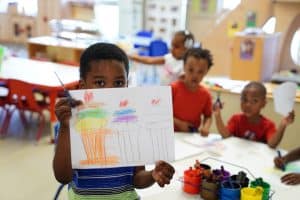
Alyia, who has been teaching at Educare Chicago, a program of Start Early, for 23 years, shared her observations and concerns with the school’s family support specialists, and together, they arranged a visit to the student’s home. These sorts of discussions are critical for providing families with a multi-perspective and multi-expertise support system. This holistic approach is a core component of high-quality early childhood programs. It provides valuable support for students and can help connect their families to important resources.
Support Our Teachers
Give a gift that will ensure teachers like Alyia have the resources needed to support young children and families in powerful and life-changing ways.
“We did a home visit and found out that her lights were out… That’s why she was drawing all in black,” Alyia explains. “After we realized that, we talked about things you could do in the dark, you know, to try to lessen the negativity behind having the lights out.”
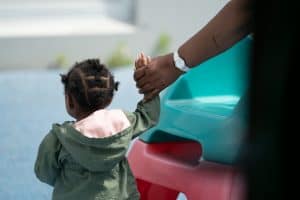
The Educare Chicago team realized during the home visit that the family was living with relatives, and that they would be best suited for success if they had their own apartment.
The school’s family support specialists worked with the student’s mother to help her obtain her own housing and connected her with utility payment assistance programs.
At Start Early, we believe that parents are a child’s first educators, which is why we prioritize family engagement in our early learning programs. Family engagement in early education is particularly important for children and families in communities that are under-resourced, in that it helps create consistency between the home and school environments. The positive outcomes of engaged parents are powerful: increased support for children’s learning at home, empowered parents and improved family well-being.
When Alyia reconnected with the family several years later, she discovered that they were still successfully living on their own.
“We were talking and she brought up how embarrassed she had been during that home visit,” Alyia says. “But, she said, ‘We only had candles and you acted like it was nothing. That took away the sting of it… I knew then that it was going to be all right.’”
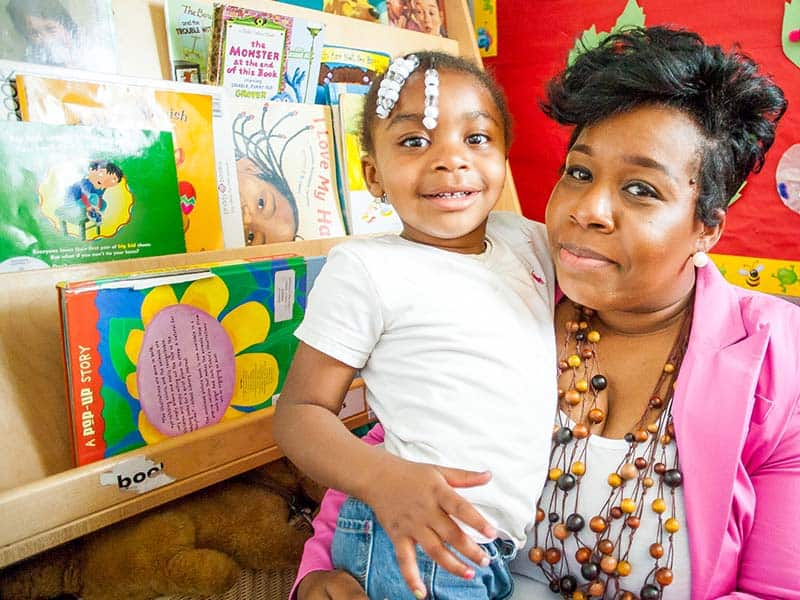
Support Our Teachers
For 40 years, Start Early has provided doula, home visiting and Head Start programs while advocating for policies and adequate funding to make high-quality early education programs, like Educare Chicago, available in communities across the country. Supporting our vital work ensures that teachers like Alyia have the resources needed to support young children and their families in powerful and life-changing ways.
The supports available through our high-quality early childhood programs don’t just provide for the needs of students while they’re in the classroom; they also address challenges at home that could keep a student from thriving in pre-kindergarten and beyond.
“A lot of the circumstances we witness go way above and beyond the norms for what a teacher is supposed to encounter,” Alyia says.

That’s why high-quality early childhood programs often rely on experts that can help families connect with mental health resources, find safe housing and obtain food assistance. At Educare Chicago, family support specialists and mental health consultants work diligently with parents to ensure the needs of their entire family are being met.
Additionally, our programs connect parents of young children with their peers, creating supportive communities that benefit both adults and their kids.
“Our parents build relationships with other adults that they maintain outside of Educare Chicago. We’ve had a few parents that built relationships where they would take their kids on outings with each other,” Alyia says. “They’re building relationships and making connections that will outlast their child’s time in our program.”
In honor of Women’s History Month, we’re commemorating women’s vital impact and accomplishments on society.
Our Start Early staff members: Keneischia Jones, health coordinator, Early Head Start Network; Rio Romero-Jurado, policy manager, National Policy and Kayla Goldfarb, policy specialist, Illinois Policy shared how their womanhood has influenced their career journey, the crucial importance of pay equity in early childhood and the need for inclusion and continued progress for all women.
How has being a woman influenced your identity?
Keneischia Jones: Being a woman of color is my daily makeup. I get to wake up and change my hair and wear my afro today because that’s what I’m feeling. I’ve become the young Black woman that I wanted to be when I was younger and I wasn’t able to present like this. Now as a woman I have my bearings and I can show the world who I am at all times.
Rio Romero-Jurado: My identity in being a woman and a woman of color in particular has really shaped my values, social conscience and the kind of person I want to be and what I want to contribute to the world. I came to social work, policy and advocacy because I was naturally drawn to eliminating inequities in our society and empowering other women through social change and action.
That’s part of why I love what I do. Even in elementary school I really loved social studies. I recognized pretty early on that there was an underrepresentation, we all know, of women and people of color at our highest levels of government. I think that’s really further motivated me to embrace my identity as a woman and to be part of an organization to help ensure that women and the issues that matter to them and their families are prioritized in our society and in policy.
Kayla Goldfarb: There are so many things that have been shared that really resonated with me and are really energizing. Being a woman has influenced my identity in that I don’t feel limited in any way. But I also recognize how much of a privilege that is when you look at women globally and locally because that is not always the case. I’ve begun to understand the breadth of how people experience being a woman from a race, class, location and lived experience perspective. It’s been mind opening.
Are there any misconceptions about women that you want to address?
Keneischia Jones: We are not too emotional to make important decisions. We are not led with emotions we have the capacity to be emotionally aware and emotionally intelligent and logical at the same time. I also want to stress as a Black woman that we are not angry. We can clearly speak our problems but we are not a threat and we’re not angry all the time. We’re just passionate and loving people.
Rio Romero-Jurado: There is a balance between recognizing that there have been strides made in gender equality and at the same time acknowledging the continued work that is needed to achieve true equitable progress. We now have a woman of color as our Vice President which is fantastic. But we’re still so behind in many ways and that is a misconception of thinking that we’ve reached a certain milestone, which we have, but we’ve got to keep making more progress. There’s so much more to be done.
Kayla Goldfarb: I really agree with Rio I think there’s certainly a danger in complacency and being like yeah we won. There’s so many domains in which women don’t have equal footing and I think it’s important to take time during Women’s History Month to look at spaces where women’s accomplishments have been relegated to the back and not acknowledged or fully covered up and taken as someone else’s.
I can think of science domains where women’s discoveries were rebranded as men’s. Hedy Lamarr for example was a movie star in the 1930s and 40s but was also the inventor of frequency hopping and her inventions were taken and the credit was given to men. I think in very present ways that still happens a lot and translates to things like pay and career advancement and the fact that women don’t get the automatic recognition that maybe men do.
In terms of misconceptions, I think one is that caring about women’s rights is in any way exclusionary to people who weren’t born women but identify as women. Trans exclusionary embodiments of feminism are not good for women. The misconception that there is in any way a threat to women’s progress by upholding and defending the rights of those who identify as women but who might not have been born identifying that way. So there’s clearly a long way to go.
But it’s nice to take time during Women’s History Month to think about how these things show up historically and in our day-to-day lives.
Be sure to follow our blog to stay up-to-date on the latest announcements and learn about our ongoing diversity, equity, inclusion and belonging (DEIB) work.
More Like This
Each year, we celebrate Black History Month to recognize the contributions and influence of African Americans to the history, culture and achievements of the United States.
Our Start Early staff members: Erice Evans, senior financial analyst; Stuart Lassiter, early childhood practice consultant; Kristie Norwood, education manager for the Early Head Start and Head Start Network of Illinois shared how their heritage has shaped their identity and impacted their work, how they maintain their culture and why it’s important to recognize Black History Month.
How do you feel that your African American heritage has influenced your identity and what do you appreciate most about being Black?
Kristie Norwood: What I appreciate most about being Black is being Black. It is a heritage and legacy of strength and strong traditions of faith and family. I love that feeling of coming into a room and even if there’s only one other Black person there is an immediate connection of knowing each other.
Erice Evans: We come from a very rich background and history that I appreciate as I’m older now that I didn’t really know to appreciate growing up. I love the melanin and the different colors, characteristics, traits and everything that makes us a beautiful people from the outside to the inside. My [African American] heritage has made me who I am today.
Stuart Lassiter: Being Black is my identity and it’s how I’m recognized by others and also how I recognize myself. My family has always stressed what it means to be a Black male. The idea that I heard from my great grandfather, grandfather and uncles of being the best you can be because you have to work from a place of excellence to be seen as being good.
One thing I truly appreciate is our strength, perseverance and striving to always overcome. It’s amazing that we’ve come so far and still have so far to go.
Erice Evans: I love that you mention strength because it is part of our heritage. We were taught the skills to overcome anything. If you get knocked down get back up and keep fighting. We don’t stay down.
What drew you to want to work in early childhood education?
Are there any misconceptions about Black culture that you want to dispel?
Erice Evans: For many years it seems that we as Black people have always been portrayed in a negative view. It’s never about the accomplishments that we have made or all the good that we have done, our creativity, the things we do in and for our community.
When you see us on the news it’s always something negative and we became a people to be feared and wrongly so. We’re not all the same although we’re viewed that way. In every person there is good, bad and also great and we deserve to be recognized for that.
Stuart Lassiter: One of the misconceptions is that I’m a Black male so I must be dangerous. The narrative in the media is that Black people are dangerous. If you look at the 10 p.m. news there is always a story about a shooting or a drug raid. I’m not diminishing it those things do happen.
But there is an overwhelming percentage of people in Black communities who are law abiding, go to work and want to provide for their children. But that is not the narrative being shared.
Kristie Norwood: I think people have misconceptions about Black people and Black culture for various reasons. I don’t feel like I’m here to discount anybody’s misconceptions. I think there is enough evidence out there to give people a complete picture of the Black experience in this world, not just in this country.
If there is one thing I want to stress is that Black people are not a monolith we are not all the same. We have joys, triumphs and sorrows like any other people and we each have different opinions. I’m sad that as Black people we don’t always get the luxury in being taken as individuals.
Why is Black joy so important?
Why is music so foundational to Black culture?
Kristie Norwood: Music is so important because it is a communication vehicle that goes past your ears and right into your soul. It provides strength, encouragement, celebration and joy. During the Civil Rights movement they sang songs to keep each other encouraged, remind themselves of what the goal was and keep fear down. When I think about some of the times in my life music has been the vehicle that really helped me stay in it long enough to get from point A to Point B.
Erice Evans: Music is a part of who we are. Music is how we coped and it’s the soundtrack of our lives. Church is a big thing in our culture and you would hear your grandparents or parents sing old gospel hymns around the house to lift them up during times of challenge or sorrow.
We are a very passionate people and music is how we express ourselves. Music is how we brought who we are to life and to the world.
Stuart Lassiter: Music is hope and joy. Go back historically and it was communication and freedom. Slaves sang songs in code to communicate where you should go, when you should leave and when you should stop if danger was around. Music was survival and freedom.
The contributions to all forms of music. The richness and experience of life that’s being shared when Black people share their music. Music spans the gambit of life from birth and being children to teenage and adult years. Blues, jazz, country, pop, hip hop and gospel. Black people have given such a worthy contribution to the world of music.
This year’s Black History Month theme is health and wellness. Why is it important for African Americans to prioritize health and wellness?
Erice Evans: The pandemic highlighted what we already knew. We were most affected when the pandemic hit because we don’t all have access to quality health care and that’s been across generations. We suffered a lot throughout COVID-19, we’ve been suffering, but the pandemic brought it to light so the world knows it too. It couldn’t be hidden anymore.
It’s time to address those deficiencies so that we can get the quality healthcare, education and opportunities – the jobs, pay and benefits – we deserve to help our communities.
We have to care about our physical, mental and emotional health and teach our children that from birth to age five to teenagers to adulthood. We didn’t have access to mental health care and within our community it was taboo to say I need a therapist. We’re used to being strong, but that strength doesn’t mean we have to carry the whole burden.
Stuart Lassiter: The mortality rates of Black people are among the highest in so many health categories: cancer, diabetes and infant mortality.
There are barriers to access to healthy food, healthcare and quality education so you can attain greater opportunities through your job to care and mental health. It’s all packaged together. If there’s something that’s deficient in your health and wellbeing it impacts other aspects of your health.
Erice Evans: We should be able to have it all. There are other communities that have it all and we shouldn’t have to pay astronomically to get it. Some communities if you want your child to have a good education you have to pay for it. That shouldn’t be the case.
Start Early is committed to quality education for children ages zero to five. Quality education should be available for all children. Like Stuart said if you’re deficient in one thing you’re deficient in it all and I think that’s one thing we have to address in our culture.
Kristie Norwood: We have to make our health and wellness a priority because if we don’t historically it’s been proven that nobody else will.
We can’t build a sick legacy. Our men and women are dying because of heart disease, cancers related to diet and stress and mental health issues leaving families behind. We need to be well so we can experience joy, exuberance, abundance and brilliance so we can keep giving that to our children.
So my hope is that health and wellness and particularly mental health becomes a legacy for us in the same way that our other traditions of church, food and celebrations.
Do you have any closing remarks?
Be sure to follow our blog to stay up-to-date on the latest announcements and learn about our ongoing diversity, equity, inclusion and belonging (DEIB) work.
More Like This
Nurturing others comes naturally for Victoria Barajas, who has found her true calling as a home visitor. After spending 10 years working at an early learning school, she was drawn to home visiting’s ability to create supports for the whole family that build a strong foundation for years to come.
The “Yes Moment”
Home visitors like Victoria help parents engage in their children’s education and get a better understanding of developmental milestones. “A lot of parents are not aware that what they bring to the table impacts their child’s development,” she shares. “As parents get more involved, they’ll tell me things like, ‘Wow, I didn’t know my child could do this. I thought they were too small,’ and it makes them more eager to be involved.”
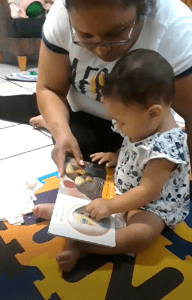
This builds a strong foundation for future learning. “Having the parent involved shows the child that their parent took the time to be with them and interact with them, so they feel confident enough to detach and interact with other adults,” she explains. When the child gets older, they’re more receptive to what they’re learning, are better able to problem solve and have increased communication skills.
For Victoria, the “yes moment” comes when parents begin to follow their child’s curiosity and development. “We can’t choose their interests for them — if we don’t follow their curiosity, they won’t want to learn anything else,” she says. “I know it clicks when parents say, ‘Wait, I know we planned for this because that’s what they were interested in last week but they’re not interested in that anymore. Can we do this instead?’”
Meeting Families Where They’re At
As a Spanish-speaking Latina, Victoria knows being part of a diverse home visiting workforce is essential to fostering intimate relationships with her families.
“You need to be empathetic and meet parents and families where they are at. It’s beneficial that I can connect with families in their language. It’s where they feel more confident in speaking and interacting with me because that is how they’re communicating with their child,” Victoria explains.
It is important to consider each family’s home culture and how they interact with their child. “Even among Latinos, Mexicans speak different dialects and Ecuadorians have different vocabulary so you can’t go into the home assuming everyone speaks the same type of Spanish.”
By building relationships with every adult in the home, including grandparents, Victoria builds a foundation of professionalism, empathy and cultural sensitivity. “When you do that, the adults give you so much more to work with and are open to receiving whatever you bring to their home,” she shares.
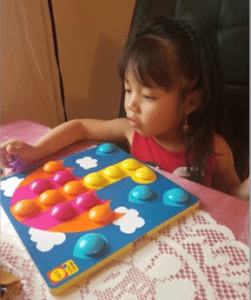
Supporting the Whole Family
In addition to helping parents build strong relationships with their children, home visitors connect families to the resources and supports in the community they need to thrive. Particularly during times of high stress, a parent may feel unable to give their full self to supporting their child. That’s why home visiting provides comprehensive supports to families. It’s only when a parent feels 100% that they can be fully present.
“I tell families that I’m here to work with the family as a whole, not just the child,” she shares. “If parents are focused on what they’re going through financially or dealing with depression, I know only supporting children’s development isn’t going to help. Once we address families’ basic needs and supports, we start to see an increase in parent interaction.”
During the pandemic, Victoria helped her families access basic needs like diapers, baby wipes, formula, cleaning supplies and gift cards to purchase additional items. “All my families said they really appreciated it, especially those who lost their jobs. It kept them afloat,” she recalls.
One of the biggest challenges during COVID was helping families with technology needs. Victoria helped her families navigate a variety of issues, from lacking access to a laptop or tablet to not having enough data to download the new apps required for virtual meetings. When some of her parents struggled to download mobile apps because the instructions were in English, she shared screenshots and instructions in Spanish.
As the pandemic ebbs and Victoria is able to resume in-person visits, she continues to prioritize each family’s perspective and comfort zone. “There are some families that are very relaxed and open to visitors and others that are very cautious as to their interaction with the rest of the world. I work with each individual family and meet them where they are.”
The Impact of Her Work
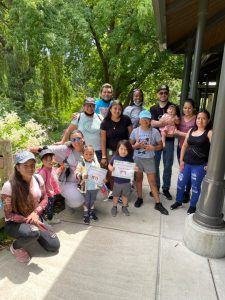
Now nearly 20 years into the work, Victoria remains passionate about being able to make a difference in children’s lives and help their parents understand why it’s important for them to be a part of their children’s development. Her reward is the pictures and text messages she receives from parents sharing a video of a first step, a photo from a birthday party, or an update from school.
“I got into this work for personal reasons, but working with families so closely and seeing the impact of my work is incredibly meaningful.”
More Like This
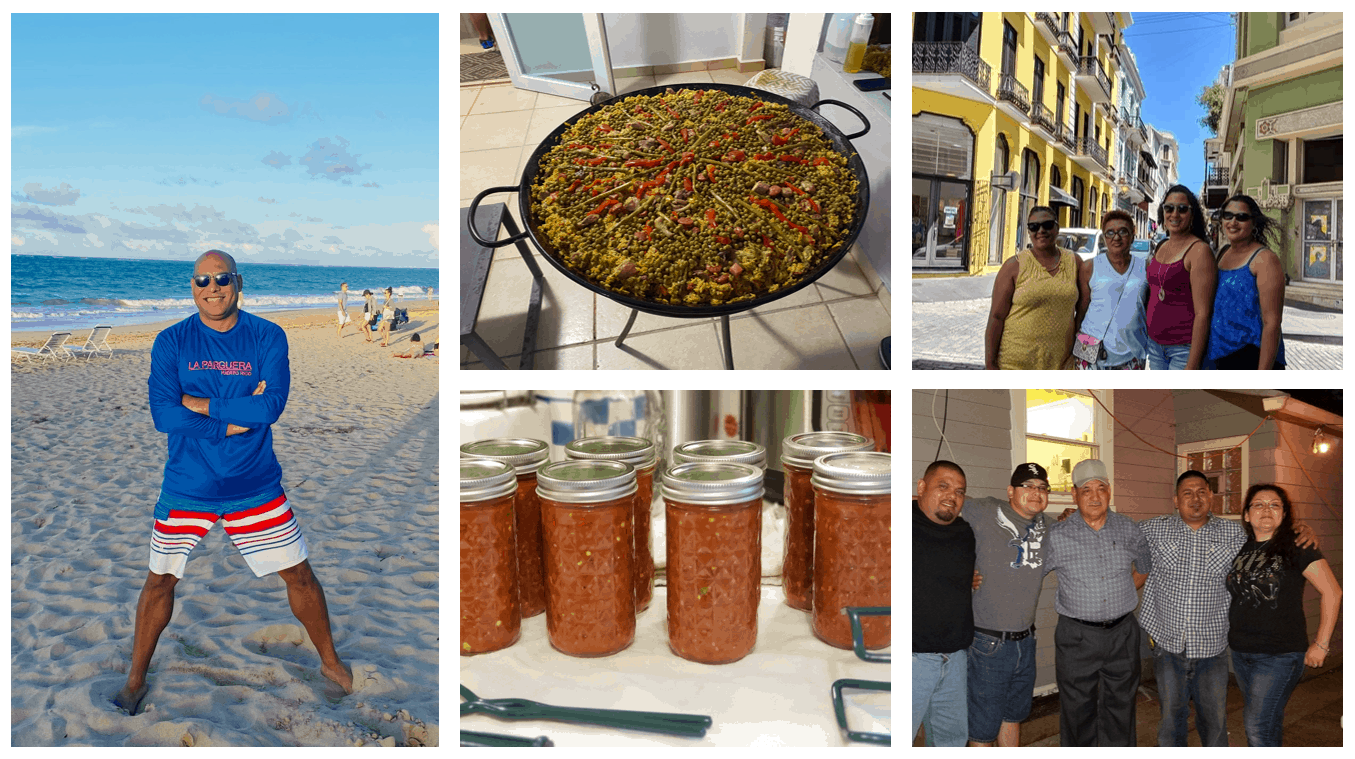
Each year, we celebrate Hispanic Heritage Month, from Sept. 15 to Oct. 15 to recognize the contributions and influence of Hispanic Americans to the history, culture and achievements of the United States.
Our staff members shared how their heritage has shaped their identity and impacted their work, how they maintain their culture and why it’s important to recognize Hispanic Heritage Month.
Can you introduce yourself and share what you do here at Start Early and how your Hispanic heritage influenced your identity?
Nilda Barrett: I’m a financial manager supporting 15 divisions and have been at Start Early for almost two years. I’m Puerto Rican, born and raised in Chicago and I’m the second youngest of seven children. My parents came to the States when they were very young and met here in Chicago. They taught me and my siblings the importance of education and working hard to get the things you need. We lived in mainly Hispanic neighborhoods, so I grew up around Cubans, Mexicans and Puerto Ricans and was exposed to a little bit of everything and got to see how hard people worked. The person I am today, my ambition, everything is inspired by my upbringing and due to my culture.
Yáyá Cardenas Torres: I’m a training institute coordinator for the Professional Learning Network and I’ve been with Start Early for 14 years. I’m Mexican American born and raised in Indiana and I’m a proud Hoosier. My mother was born and raised in Texas and my father was born and raised in Michoacán, Mexico. I am the only girl out of five brothers.
With my mother being Tex-Mex and my dad being Mexican, I had two cultures: One uses cheddar and one uses Chihuahua, but together they are perfect on a burrito. My culture has made me who I am. My upbringing, my loyalty, my faith, my passion… it is who I am and I apply it to my professional and personal life.
Alexis Aguilú Hernandez: I’m the assistant director of operations for the Educare Learning Network and have been at Start Early for 14 years as well. I’m one of two and was born and raised in Puerto Rico. I left the island at the age of 20 to attend Marquette University in Wisconsin and stayed here. I have a ton of family in the Midwest.
Puerto Rican is who I am. I live my life as a Puerto Rican and I love my Puerto Rican heritage. I get chills every time that I go home. On the flight home, I always plan to sit by the window so I can see the whole island as we descend. It’s who I am, it’s family and how I grew up. Seeing the flag, it’s who I am and I like to share that with others who may not understand what being Puerto Rican and Latinx is.
How has your Hispanic heritage impacted your daily work to advance our mission and better serve children and families?
Alexis Aguilú Hernandez: I always say that my Hispanic background is not only what identifies me, but what defines me. Being a Hispanic immigrant allows me to better understand the challenges that many of our Hispanic children and families go through and focuses my commitment to do everything I can to help them close that opportunity gap once and for all.
I have been able to use Spanish several times in my role at Start Early. We started sending out text messages to families and I would translate them into Spanish. Most recently, at the Educare Learning Network, I helped review our network requirements and Child Tax Credit communications in Spanish. Knowing languages opens your mind to the world.
Yáyá Cardenas Torres: Being Mexican American and bilingual provides me with cultural sensitivity and enables me to better serve our Spanish-speaking clients. My parents also taught me to have a solid work ethic, ambition and commitment which I use in my daily work.
What do you appreciate most about your Hispanic culture?
This month really helps people recognize the complexities, histories and richness of the different Hispanic cultures. It’s very important to celebrate Hispanic heritage.
Nilda Barrett
How do you preserve your Hispanic culture?
Yáyá Cardenas Torres: I try to preserve our culture with food. Any gathering we host, I’ll cook Mexican dishes. My dad and I both have gardens and I love to make homemade salsa using everything from jalapeños to habaneros and Anaheim chili peppers and share it with everyone. I feel very close to my mom when I make salsa because I remember growing up she would make it and give it away to our neighbors. I also share my culture with my son and foster kids: we celebrate Día de los Muertos (Day of the Dead) and Día de los Niños (Day of the Children). I try to incorporate it everywhere I can.
Nilda Barrett: Similar to Yáyá, we are very family oriented. We took a trip to Puerto Rico in 2018 and are looking to go again next year. Everything from la música — salsa, merengue, reggaeton, bachata — to la comida. My mom will come over and make pastelitos (a Puerto Rican pastry filled with guava and cheese) and my four kids love them. I also instill in my kids the importance of learning Spanish because being bilingual is such an asset.
How would you describe the diversity within your family?
Are there any misconceptions about Hispanic culture that you want to dispel?
Why is it important to celebrate Hispanic Heritage Month and recognize the impact Hispanic people have had within the U.S.?
Nilda Barrett: Hispanic culture has contributed so much to the development of the United States over the years and it just keeps growing. This month really helps people recognize the complexities, histories and richness of the different Hispanic cultures. It’s very important to celebrate Hispanic heritage.
More Like This
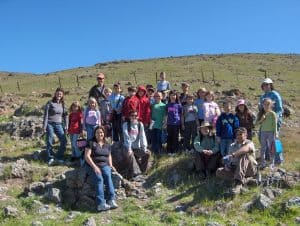 Teri Rogoway’s love of nature started early, with her own mom. “My mom taught me from a really young age that nature was a gift and that we could be better people as a result of interacting with nature,” she shares. “I’ve always had a positive experience in nature and I wanted to give those kinds of experiences to other people.”
Teri Rogoway’s love of nature started early, with her own mom. “My mom taught me from a really young age that nature was a gift and that we could be better people as a result of interacting with nature,” she shares. “I’ve always had a positive experience in nature and I wanted to give those kinds of experiences to other people.”
As the educational programs coordinator for the Santa Clara Valley Open Space Authority, Teri helps children engage with nature from an early age. “We do stroller walks with parents and infants and toddlers, where we let the kids play outside and make things out of twigs, rocks and leaves. I never tell them what to make, I just let them create,” she notes, which helps build creativity skills that follow them into their later years.
Engaging parents is key to increasing young children’s exposure to and appreciation of nature. “You want parents to feel comfortable being out in nature because children watch how their parent responds. If the parents are afraid, then a child might pick up on that fear and carry it with them through life,” she explains.
Nature’s Impact on Early Childhood Development
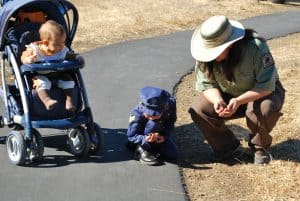 Throughout her career, Teri has seen the benefits of engaging children early in nature. “Parents who go hiking with their child in a baby backpack, let them play in parks, climb trees, rescue worms and jump in puddles are building up their child’s immunity and increasing their motor skills,” she shares. “Those kids, who have been encouraged to play in and explore nature, are less fearful, more creative and know how to calmly interact with other people.”
Throughout her career, Teri has seen the benefits of engaging children early in nature. “Parents who go hiking with their child in a baby backpack, let them play in parks, climb trees, rescue worms and jump in puddles are building up their child’s immunity and increasing their motor skills,” she shares. “Those kids, who have been encouraged to play in and explore nature, are less fearful, more creative and know how to calmly interact with other people.”
In addition to nature’s impact on children’s cognitive development, Teri also sees mental and emotional health benefits for parents. “I want parents to feel the healing, peaceful aspects of nature that they can get away even if it’s just to a little neighborhood park or a vacant lot with wildflowers.”
“Nature is big enough to take anything that we have to give any stress or worry. Kids will respond to their parents being less stressed and spending time in nature also creates beautiful family memories that they can look back on.”
Virtual Programming during the Pandemic
During the pandemic, Teri and her team pivoted to provide online programs via Facebook Live and Zoom to continue to share the benefit of engaging in nature. “Our team gave live virtual trail tours showing people different plants and animals while they answered questions like, ‘Susie from Oakland would like to know what that green flower is called to the left.’”
She saw the benefits for her staff who also missed the in-person interaction with visitors and one another, “We were so grateful to be able to do that and help others and ourselves fight that sense of isolation, it felt like we were fulfilling our purpose.” The park is now open for in-person visits with COVID-19 precautions in place (e.g., one-way trails with social distancing) and is seeing an increase in visitors.
As we celebrate National Arbor Day and parks continue to open, Teri encourages us all to head outdoors: “Nature is where we belong and the place we go to for healing, peace and restoration. Give yourself permission to enjoy time outside for yourself; we work so hard but remember Mother Nature is there to give back to you.”
“As a child care provider, I always imagined I’d do something with new parents,” recalls Tina Greer, a doula for the Child Abuse Council’s Healthy Families program in the Quad Cities, one of the 30 home visiting programs in Start Early’s Home Visiting & Doula Network.
Tina was propelled to become a doula after experiencing the unimaginable loss of her own son at just 17-days old. She knew becoming a doula combine her passion for social work and new families. She also knew that having experienced loss equipped her with the empathy and resources to help families in similar situations. Now, nearly four years later, Tina is close to securing her Stillbirthday Bereavement Certification so that she can offer parents experiencing loss this unique support.
“You have to turn that loss into something positive otherwise it’s unbearable to live with,” she reflects.
Making Impact for Those Most in Need
 As a doula, Tina helps each birthing person achieve their healthiest pregnancy, labor and birth possible by providing educational, emotional and physical support at every stage of the journey.
As a doula, Tina helps each birthing person achieve their healthiest pregnancy, labor and birth possible by providing educational, emotional and physical support at every stage of the journey.
Tina believes her own experiences — as a first-time mother relying on WIC and Medicaid, and as the daughter of a teenage mother who was in the situation a lot of her clients are in now — help her relate to her clients on a deeper level.
“It’s really important that people in underserved communities get the access they deserve to professional pregnancy, labor, and postpartum support,” Tina shares. “We help all families realize they can bond with their baby in the womb, that they have a voice when they go the hospital and options during labor and birth.”
One of her favorite parts of her work is teaching parents ways to bond with their babies through modeling. “I help show how easy it is to talk with a developing baby,” she explains. “Some parents aren’t comfortable reading to a baby in utero but seeing me put myself into an awkward situation and model this can make them more open to trying it themselves.”
For Tina, watching parents grow into their roles is the ultimate reward. “It’s incredible to watch the transformation into parenthood,” she shares. “I get excited and overjoyed watching the families I work with utilize tools I helped equip them with during pregnancy.”
A Champion for Mental Health Care
Tina’s personal relationship with each pregnant person helps her ensure they receive the necessary support throughout their prenatal journey, including mental health supports.
Tina recalls one young mother, who disclosed that she was struggling with depression as a result of sexual abuse as they walked through her birth plan. When Tina asked if the mother had talked to her provider about it, the mother responded that she hadn’t and was too afraid to bring it up.
“She was too afraid that if they found out she was depressed and had all of this past trauma, they would take her baby away,” Tina recalls.
Tina secured the young mom’s consent to attend her next prenatal appointment with the mother and gently raise the issue of mental health and postpartum depression with the OB-GYN, eventually leading to a referral for therapy and medication.
“For someone in the medical field to tell her, ‘You have the potential to be a great mom with depression,’ that was all she needed. She became more confident as a parent.”
Tina also ensured that the young mother was able to establish safe boundaries with her nurses and doctor during labor. “When we did her birth plan, she wrote at the top in red ‘I am a survivor of sexual trauma. Do not put your hands on me without my consent.’ And as a result, everyone was very respectful of her space and boundaries,” she remembers.
Virtual Support and Moving Beyond the Pandemic
Given the hands-on nature of her work, the transition to virtual support has been “a wild ride” for Tina. “It’s been very challenging to not get to see my clients face-to-face if they don’t have the ability to do Zoom or Facetime,” she shares.
To follow state guidelines during the pandemic, Tina had to stay out of the hospital room with her laboring clients, so she used a sanitized traveling tablet to virtually interact instead. “I haven’t been to a birth since March 2020 and that has been heartbreaking to not be in the room with my clients,” she says.
One surprise benefit of the virtual outreach is the ability to engage on a more personal level. “I have my kids running around in the background when I’m on Zoom and it has taken a layer of professionalism away,” she admits. “But it’s also allowed my clients to connect to me because they see I’m real and struggling like they are.”
As the pandemic subsides, Tina is eager to get back into the labor and delivery room with her clients because, as she says, “Research has shown that having continuous labor support creates better birth outcomes.” She knows the benefits of the presence of doulas in birth and in the postpartum period play an important role in helping parents and infants create a foundation for success.

